|
Sir Isaac Brock— His
Parentage and Former Services - Raising of the Glengarry Light Infantry by
Captain George Macdonell of the King's Regiment and the Reverend Alexander
(Afterwards Bishop) Macdonell— List of Officers—Officers of Flank Companies
Glengarry Militia—Corps des Voyageurs Canadiens—Canadian Fencible Infantry.
Sir George Prevost was
Governor-General of Canada and Commander of the Forces, his Headquarters
being at Quebec, while to quote from a commission signed by him, before me,
"Isaac-Brock, Esquire," was "President administering the Government of Upper
Canada and Major-General commanding His Majesty's Forces therein." To the
fact that he was is largely due the preservation of at least this Province
to the British Crown and to us the institutions it is alike our privilege
and our heritage now to enjoy.
From Mr. Martin Brock
Tupper's "Life and Correspondence of Sir Isaac Brock," I gather principally
the following particulars regarding the man so deservedly designated "The
Saviour of Upper Canada." His name will be remembered with gratitude by our
people, as his biographer stated of a Glengarry man who shortly afterwards
fell with him, "As long as courage and devotion are reverenced in the
province ":
General Brock was the eighth
son of John Brock, a gentleman of ancient family in the Island of Guernsey,
by Elizabeth De Lisle, and was born on the 6th October, 1769, the memorable
year which gave birth to Wellington and Napoleon.
He received his commission as
ensign in the Eighth (the King's) Regiment 2nd March, 1785, and served in
Guernsey and Jersey., in 1790 receiving his company. He then exchanged into
the Forty-Ninth Regiment, which he joined at Barbadoes in 1791, but was
shortly afterwards compelled to return very suddenly to England on sick
leave, having nearly fallen a victim to the pestilential climate. He was
then employed on recruiting service in England, and in 1795 purchased his
majority. In 1797 he purchased his lieutenant colonelcy, when but
twenty-eight years of age, and soon after became Senior Lieutenant Colonel
of the Forty-Ninth. He served with distinction under Sir Ralph Abercrombie
in Holland in 1799, and was wounded at Egmont op Zee, where thirty of his
regiment were killed and fifty wounded. The loss of the enemy on that
occasion was estimated at four thousand men.
His next active service was
at the celebrated attack on Copenhagen by Lord Nelson in 1801, when
Lieutenant-Colonel Brock was second in command of the land forces, and where
his brother, Savery Brock, also greatly distinguished himself.
In 1802, his regiment, the
Forty-Ninth, was ordered to Canada, being stationed at York (now Toronto) in
1803. In 1805 he was made full colonel, and returned on leave to England,
that being his last visit, and early in the following year he laid before
His Royal Highness the Commander-in-Chief, the outlines of a plan for the
formation of a veteran battalion to serve the Canadas, recommending that ten
companies should be raised, each of sixty rank and file, with the usual
proportion of officers, distributed ill the following manner:—
St. John and Chambly, one
Company ; Kingston, one Company, York, two Companies; Fort George and
dependencies, three Companies ; Amherstburg, two Companies; St. Joseph, one
Company.
Colonel Brock received the
thanks of the Duke of York "for the communication of his very sensible
observations respecting the distribution of the troops in Canada, which His
Royal Highness will not fail to take into consideration at a seasonable
opportunity." As in the case of Colonel Macdonell's recommendation on a
kindred subject, nothing however appears to have been done at the time
towards carrying out the views of these far-seeing men, who were so well
acquainted with the country and its defensive requirements.
While on a visit to his
family and friends in Guernsey, Colonel Brock deemed the intelligence from
the United States to be of so warlike a character that he resolved on
returning to Canada before his leave was expired, and such was his anxiety
to be at his post that he overtook at Cork the "'Lady Saumarez," a Guernsey
vessel, well manned and armed as a letter-of-marque, bound to Quebec. He
left London on June 26, 1806, never again to return to home and kindred.
On September 27, 1806, he was
appointed to the command of the troops in both Provinces, with the rank of
Brigadier, his appointment as such being confirmed by the King to date from
July 2, 1808
In September, 1806, he
addressed a very able representation to the Horse Guards with regard to the
defence of the country:—
"It is impossible to view the
late hostile measures of the American Government towards England without
considering a rupture between the two countries as probable to happen.
"I have in consequence been
anxious that such precautionary measures might be taken as the case seemed
to justify; but His Honour the President (Dunn, with whom Sir Isaac did not
appear to agree) has not judged it proper to adopt any other step than
merely to order one-fifth of the militia, which amounts to about ten
thousand men, to hold itself in readiness to march on the shortest notice.
"The men thus selected for
service being scattered along at extensive line of four or five hundred
miles, unarmed and totally unacquainted with everything military, without
officers capable of giving them instructions, considerable time would
naturally be required before the necessary degree of order and discipline
could be introduced among them. I therefore very much doubt whether, in
event of actual war, this force could assemble in time, and become useful.
"Without considerable
assistance from the militia, the few regullars which might be spared from
this garrison (Quebec) could avail nothing against the force the Americans
would suddenly introduce by various routes into this Province."
After referring to the state
of affairs in Lower Canada, he continues, "From every information I can
receive, the Americans are busily engaged in drilling and forming their
militia, and openly-declared their intention of entering this Province. The
very instant war is determined upon, they will be encouraged to adopt this
step from the very defenceless state of our frontiers. The means at my
disposal are too limited to oppose them with effect it the open field, and I
shall be constrained, unless His Honour the President makes exertions, which
I do not think him disposed at this moment to do, to confine myself to the
defence of Quebec."
He then narrates the
preparations he had made for placing Quebec in a defensive condition, and
proceeds, "Although these remarks may be premature, I yet conceive it to be
my duty to give His Royal Highness, the Commander-in-Chief, a view of my
real situation.
"I must confess that I am
unable to account for the motives which. seem at present to guide the
Councils of this Province. Voluntary offers of service have been made by
numbers, on whose loyalty the utmost reliance can be placed, to form
themselves into corps of cavalry, artillery and infantry, at little or no
expense to Government) provided they were furnished with arms; but this
liberal spirit has not been encouraged by the President."
In 1808 Colonel Brock was
stationed at Montreal, which, from the description of its society given by
Washington Irving in "Astoria," was a good place to be quartered in. These
were the palmy days of the then celebrated North-west Company, "which for a
time held a lordly sway over the wintry lakes and boundless forests of the
Canadas, almost equal to that of the East India Company over the voluptuous
climes and magnificent realms of the Orient." The principal partners resided
at Montreal, where they formed a commercial aristocracy and lived in a
generous and hospitable manner. Few travellers who visited Canada at this
period in the days of the Mactavishes, the Macgillivrays, the Mackenzies,
the Frobishers and other magnates of the North-west when the Company was in
all its glory, but must remember the round of feasting and revelry kept up
among these hyperborian nabobs. With these merchant princes Colonel Brock
lived on terms of much intimacy.
In 1810 Brigadier Brock was
sent to Upper Canada where he remained in command of the troops until his
death, Lieutenant-Governor Gore at first administering the civil government.
In 1811 he was promoted and
appointed by the Prince Regent to serve as a Major-General on the staff of
North America and on October 9th of the same year was appointed President
and Administrator of the Government of Upper Canada in succession to
Lieutenant-Governor Gore, who had returned to England on leave. General
Brock had previously expressed his desire for more active employment in
Europe. and Sir George Prevost was authorized to replace him by another
officer, but when the permission reached Canada early in 1812, war with the
United States being evidently at hand, Major-General Crock was retained both
by honour and inclination in this country.
So small was the force we
could oppose to the Americans that it became a necessity at once to augment
it. Mr. Auchinleck, who here confuses the dividing line between the
Provinces of Upper and Lower Canada, after explaining the reason why a
larger levy was not made in the Lower Province (the apprehension that Lower
Canadians might contract militia habits and enlist into the service)
proceeds: "This feeling, however, did not prevent the establishment of the
Glengarry Light Infantry, who numbered by the 1st May, 1812, 400 rank and
file; and we find, further, that on Sir George Prevosts issuing orders to
recruit for a still higher establishment, the officers engaged to double the
number, and did it. This does not look like disaffection; and, whether we go
still further east, or south, we trace the same spirit. We find two officers
dividing Nova Scotia and New Brunswick, and enlisting Acadians, while
Lieutenant Ranald Macdonell is reported as making great progress among the
Highland settlers on the Coast and Gulf. When we take all these
circumstances, then, into consideration, we confess that we are at a loss to
find any sounder reasons for imputing disaffection to Lower Canadians than
we have found to exist among their brethern of the Upper Province; and
although they were not called on, in the course of the events which
followed, to make such sacrifices, or give such unequivocal proofs of their
loyalty as Upper Canadians, yet we venture to assert that the animus was
there, which would have proved that in both Provinces alike the same pure
spirit of patriotism burned."
We have previously seen that
in 1807 Colonel John Macdonell, who formerly commanded the Second Battalion
Royal Canadian Volunteers, had urged upon Sir Isaac (then Colonel) Brock the
desirability of raising a corps from among the Highland settlers in
Glengarry, and that the latter had forwarded Colonel Macdonell's proposal to
the Secretary-at-War strongly recommending that it should be carried out,
but for some reason which I am unable to discover, it does not appear to
have been acted upon. It will be remembered that Colonel John Macdonell
placed much reliance on assistance in this direction from the Reverend
Alexander Macdonell, the former Chaplain of the Glengarry Fencibles (the
regiment raised in Scotland), afterwards Bishop of Upper Canada.
When hostilities broke out
some five years afterwards, and the necessity arose, that settlement was
looked to to supply soldiers for the defence of the country, and the
following letter was addressed to General Brock:—
Colonel Baynes, Military
Secretary to Major-General Brock.
"Quebec, December 12, 1811.
"I am directed to transmit
herewith a copy of proposals for airing a corps of Glengarry Fencibles. The
Commander of the Forces has selected an officer of the King's Regiment,
Captain George Macdonell, an avowed Catholic and a relative of the Glengarry
priest of this name, to attempt the formation of a small battalion to be i:n
the first instance under his command with the rank of Major, and in case a
more respectable body can be collected, a Lieutenant-Colonel Comrnandant
will be appointed. Captain Macdonell will leave this in a few days, and he
will be directed to take an early opportunity of communicating with you as
soon as he has felt his ground in Glengarry, and is able to form a correct
idea of the prospect and extent of success that is likely to attend his
exertions."
In order to measure the
important co-operation of the Catholics in Lower Canada, His Excellency the
Governor-General personally presented Captain Macdonell to the Bishop of
Quebec, as the officer specially selected to raise the corps, which had a
very important political effect, as the French-Canadians regarded the
regiment most favourably as being a Catholic one, indeed the letter of
service directed to Captain Macdonell, distinctly named the Highland
Catholic Priest in Glengarry, Mr. Alexander Macdonell, as Chaplain of the
corps— a most unusual proceeding—but which indicated to those of that faith,
though of a different race, the beginning of a new system towards them and a
flattering mark of the confidence of Government in them, exactly as the wise
policy of Chatham won the Highlanders in the reign of George the Second, and
therefore the raising of this corps immediately called forth an active
spirit of loyalty throughout all Lower Canada, whilst it raised the good
feelings of the settlers in the Upper Province. French and British Canadians
were incorporated in its ranks.
The gallant officer, Captain
George Macdonell, who was selected to raise and to assume temporary command
of the Glengarry Fencibles, was a member of a cadet family of Glengarry,
well known in the Highlands for their great strength and warlike
disposition. They were settled at Leek, in Glengarry's Country (from which
they took their name) for many generations until after Culloden, when, like
many other Highland families, they had to seek shelter elsewhere, their
house at Leek having been burned to the ground by Cumberland's troops. His
father John Macdonell of Leek, joined Prince Charles in 1745, and was on his
staff at the battle of Culloden, where he was wounded by a shot in the
thigh. He remained in hiding in the house of Grant ot Glenmoriston (his
grandmother being of that family) for six months until his wound healed up,
after which he walked in disguise the whole way to Hull, where he embarked
for Holland in a sailing ship, and soon after joined the Prince at St.
Germain. He subsequently served in the Garde Ecossais. Some time after,
under an assumed name, he returned to the Highlands and joined subsequently,
Fraser's Highlanders as lieutenant. His commission is dated 5th January,
1757. He fought with his Regiment on the Heights of Abraharn, before Quebec,
and was beside Wolfe when he fell. Before "the Forty-Five," he had formed
the acquiaintance of the Great general, and became so attached to him that
he named his eldest son after him. Wolfe acted as his friend, and protected
him throughout, the amnesty not having been granted for some years after the
fall of Quebec. He remained on the staff after Wolfe's death and was a great
favourite with his brother officers. On a certain occasion one of the
Hessian officers on the staff had a difference with him about a lady, when
the Hessian denounced him as a rebel Highlander. The whole headquarters were
indignant and spurned the accusation. Macdonell challenged his accuser; a
duel with swords ensued, and the German was killed, to the gratification of
some thirty officers, who witnessed the combat and strongly sympathized with
Mr. Macdonell. Among his friends in the latter days were the famous
Glengarry of George IV.'s lime and his distinguished brother, General Sir
James Macdonell, defender of Hougoumont. He served as Major daring the
American War of Independence, and subsequently commanded a veteran corps in
Newfoundland, where his second son was born in 1779 or 1780. He died at
Berwick in 1818."
Every one of this gentleman's
sons was in the army, viz.:
1. Wolfe Alexander, who was
Colonel of the Twenty-Fifth Regiment.
2. George, who served so well
in Canada.
3. James, a Captain
Thirteenth Light Infantry.
4. Charles, who died while on
service with his regiment in India.
5. Edward, who also died on
service in India.
6. Ernest, who was an officer
in the Twenty-Fifth Regiment.
Colonel George Macdonell, who
thus raised the Glengarry Fencibles, and so greatly distinguished himself
both at Ogdensburg and Chateauguay when in command of that corps, was
afterwards Lieutenant-Colonel of the Seventy-Ninth Foot. He married the
Honourable Laura, second daughter of Lord Arundel of Wardour, and died at
Wardour Castle in 1870, at the advanced age of ninety years. His son, John
Ignatius Macdonell, is now a major-general in the army, and was
Lieutenant-Colonel of the Seventy First Highland Light Infantry.
The hand of the Chaplain is
easily traced in the successful formation of this regiment (the Glengarry
Light Infantry), Colonel Coffin states that:—
"The Bishop had been most
active in rousing and recruiting the Glengarries during the preceding
winter. The Fiery Cross had passed through the land, and every clansman had
obeyed the summons. Partaking of the character of the mediaeval churchman,
half Baron, half Bishop, he fought and prayed with equal zeal, by the side
of men he had come to regard as his hereditary followers."
The Bishop himself, in a
letter to Sir Francis Bond Head, written in 1836, to repel some charges
brought against him in the House of Assembly, of having neglected his
spiritual functions to devote his time and talents to politics, after
showing how he had discharged his duty to God, the hardships and privations
he had suffered in the discharge of his sacred functions, and how he had
spent thirteen thousand pounds of his own means in building churches,
chapels, presbyteries and school houses, in rearing young men for the Church
and in promoting general education, states :—
"I never had, or enjoyed, a
situation or place of profit or emolument except the salary which my
Sovereign was pleased to bestow upon me. in reward of forty-two years'
faithful services to my country, having been instrumental in getting two
corps of my flock raised and embodied in defence of their country in
critical times, viz.: the first Glengarry Fencible Regiment was raised by my
influence as a Catholic corps during the Irish Rebellion, whose dangers and
fatigues I shared in that distracted country; ample and honourable
testimonials of their service and my conduct may be found in the Government
Offices at Toronto. The second Glengarry Fencible Regiment, raised in the
Province when the Government of the United States of America invaded and
expected to make a conquest of Canada, was planned by me and partly raised
by my influence. My zeal in the service of my country and my exertions in
the defence of this Province were acknowledged by his late Majesty through
I,ord Bathursf, the Secretary of State for the Colonies. My salary was then
raised and a seat was assigned for me the Legislative Council as a
distinguished mark of my Sovereign's favour an honour I should consider it a
disgrace to resign, although I can hardly ever expect to sit in Council."
Captain Macdonell evidently
not only filled up the ranks of the regiment in Glengarry, but distributed
rather more commissions among the gentlemen of the county than was
anticipated by or altogether pleasing to the officers at headquarters, as
appears from the following letter:—
Major-General Brock to
Colonel Baynes :
"York, January 26, 1812.
"Captain Macdonell,
accompanied by the priest, arrived here some days ago. The badness of the
weather has prevented his returning as soon as he first proposed. All the
junior commissions being already disposed of among the youths of Glengarry,
I fear that little will be done in this part of the Province towards
recruiting the intended corps. A few idlers may be picked up, but without
the aid of persons of influence no great number can be expected, unless
indeed the militia be called out and land promised.
"Understanding from Captain
Macdonell that the Commander of the Forces had applied to the Prince Regent
for permission to offer some of the waste land of the Crown as an inducement
to the Scotch emigrants to enlist, I stated the circumstance to Council, and
have much pleasure in assuring His Excellency that should he be of opinion
the present state of affairs calls for prompt measures, and that a direct
promise of land would accelerate the recruiting this Government will readily
pledge itself to grant one, or even two, hundred acres to such as would
enlist on the terms proposed by his Excellency. This will be deviating
largely from the King's instructions; but in these eventful and critical
times the Council conceives that in expression from his Excellency of the
necessity of the measure will be sufficient to warrant a departure from the
usual rukes. Should His Excellency think it expedient to act immediately,
and authorize a direct offer of land, I have no doubt that a number of young
men might be collected between Kingston and Amherstburg, in which case His
Excellency may sanction the raising of two additional companies under my
superintendence."
Sir George Prevost replied on
the 20th February, readily accepting General Brock's proposal to recruit two
additional companies to be added to the Glengarry Fencibles, the nomination
of the officers, viz., 2 Captains, 2 Lieutenants and 2 Ensigns, to rest
entirely with General Brock, and intimating his intention to recommend
Colonel Baynes, then on his staff as Militia Secretary, to the Colonelcy of
the regiment.
On the 26th January, the Rev.
Mr. Macdonell ("the Chaplain") was the bearer of despatches from General
Brock to the Commander-in-Chief, with regard to the opening and keeping up
communication between the two Provinces, "a subject which he is well
qualified to explain." In fact "the Chaplain" was evidently entirely in the
confidence of both, and relied on for active co-operation, which was
unstintingly given by that loyal and patriotic man. Had he not been a great
missionary, priest and prelate he would have been a great soldier. He used
to say that every gentleman of his name should either be a priest or
soldier.
So great had been his success
in raising the Glengarry Light Infantry that General Brock, in February,
1812, recommended the formation of a corps of Canadian Fencibles, which was
shortly afterwards accomplished. An idea of the manner in which Captain
Macdonell performed the important duty assigned to him, and the readiness
with which the people of Glengarry took up arms, may be gathered from the
following letter of 14th May, 1812, it being borne in mind that it was only
on the 12th December, 1811, that the Military Secretary wrote General Brock
that Captain Macdonell had his authorization, and would in a few days start
on his recruiting tour for Glengarry, that, the service was performed in the
depth of Winter and that there were no railways or telegraphs in those days
Colonel Baynes to
Major-General Brock :
"Quebec, May 14, 1812.
"I have great satisfaction in
telling you that I have reported the Glengarry Light Infantry more than
complete to the establishment of four hundred rank and file, and have
received Sir George Prevost's commands to recruit for a higher
establishment, indeed the quota the officers have engaged to fulfill will
nearly amount to double that number, and from the very great success that
has attended our exertions, I have no doubt of succeeding by the end of the
year. Two officers have divided Nova Scotia and New Brunswick for their
hunting ground, and are permitted to recruit Acadians, and Lieutenant Ranald
Macdonell, of the Canadians, proceeds us a few days to Pictou and the
Highland settlements on the coast and gulf, he is an officer that appears to
be eminently qualified for that service, and he is sanguine that the proffer
of lands in the Scotch settlements of Upper Canada will induce great numbers
to enlist. I am assured that the men I have got are generally young and of
good disposition, there being very few Yankees among them."
GLENGARRY LIGHT INFANTRY
FENCIBLE REGIMENT, 1813.
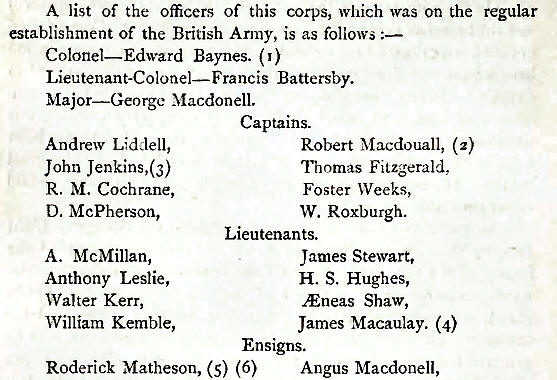
(1.) This officer had entered
the army in 1783. After serving at Gibraltar and the West Indies he became
aide-de-camp, in 1794, to Sir James Graig, afterwards Governor-General of
Canada, and was at the taking of Good Hope in 1795 and also at the capture
of a Dutch force in Saldanha Bay in the following year. He subsequently
served as A.D.C. to Sir James in the East Indies, but having obtained a
majority in the 56th, he joined that corps at Cawnpore. In 1803 he returned
to England. In 1804 he was appointed lieutenant-colonel of the 5th Foot, and
in 1805, Sir James Craig again desiring his services, he was placed on
half-pay and served as first aide-de-camp to Sir Tames at Gibraltar, Malta,
Naples and Sicily. In 1807 he was appointed adjutant-general to tne forces
in North America, which appointment he held during the whole of the War of
1812-14 and for several years afterwards. He died at Sidroouth, England, in
March, 1829. (Morgan's Celebrated Canadians, p. 200.)
(2.) This gallant officer
entered the service in 1796 and after taking the various steps, became a
major-general in 1841. When in command at Fort Michilamackinac he
successtully defended it when attacked by a very superior force, August 4th,
1814, which he drove off with considerable loss. He died at Stranaer on 15th
November, 1848. (Morgan, p. 216.)
(3.) Captain Jenkins was a
native of New Brunswick, and an honour to the Province, He greatly
distinguished himself at the taking of Ogdensburg by his gallant and
intrepid conduct, where he lost both arms, which were smashed by canister
shot, and sank exhausted from loss of blood within twenty yards of the
enemy's guns. He was most honourably mentioned in the despatch announcing
that victory, and survived the war several years. It is not creditable to
the then authorities that he never got a brevet or any other honour. His
only reward when he no longer had an arm to hold a sword was a contemptible
town majority of some £65 a year. Col. Macdonell begged, almost on his
knees, at the Horse Guards, for an increase of his widow's pension, but in
vain.
(4.) Afterwards Sir James
Buchanan Macaulay, C.B., one of the three gentlemen who served through the
war and afterwards became chief justices, the other two being Sir John
Beverly Robinson, Hart., and the Hon. Archibald McLean—all three, strangely
enough, having been pupils of Mr. (afterwards Bishop) Stachan at the
Cornwall school. He died 27th July, 1857
{5.) Afterwards the Hon.
Roderick Matheson. Born in Rossshire, Scotland, and great grandson of Dugald
Matheson, chief of his clan, who was killed in the action at Glen Shiel,
Glenelg, 10th June, 1719. Mr. Matheson was present with his regiment at the
actions at York, Sackett's Harbour, Cross Roads, Fort George, Lundy's Lane
and Fort Erie Wounded at Sackett's Harbour. He was appointed a life member
of the Legislative Council of Upper Canada in 1847, and sat until
Confederation, when he was called to the Senate by Royal Proclamation.
(6.) An officer who
subsequently served in this regiment and retired in 1816 as a captain in it
was James Fitzgibbon, subsequently colonel of the 1st Regiment of Toronto
Militia, Mr. Fitzgibbon had previously served in the 19th an 61st Regiments
as a non-commissioned officer, and had been present in the action near the
Helder and elsewhere in Holland, and was made prisoner at Egmont op Zee. At
the battle of Copenhagan he was in the "Monarch, 74,'' which had 210 men
killed and wounded, and he was afterwards, until 1801, in Lord Nelson' ship
"The Elephant". His regiment in that campaign acting as marines. While in
the Glengarry Raiment during the war of 1812-14, he was. in the battles at
Stoney Creek, Fort George and several others, including the siege of Fort
Erie. At the Beaver Dam, aided by a body of Indian warriors and with 48 men
of the 49th Regiment, he captured a force of 450 infantry, 50 cavalry and 2
guns. He rendered important services in the Rebellion of '37-8, and received
therefor a sword and the thanks of the Canadian Assembly. He was for
nineteen years clerk of Parliament. In 1850 Her Majesty the Queen, in
recognition of his services, created him a Military Knight of Windsor, from
which time until his death he resided in England.
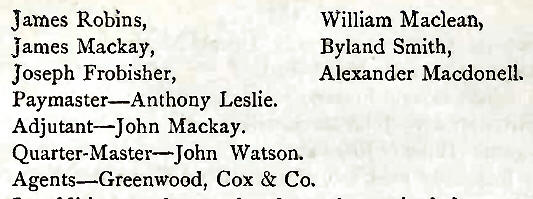
In addition to the regular
force then raised from among the people of Glengarry, there were also two
regiments of Glengarry militia.
Unfortunately, I can only
procure the names of the officers of the flank companies. 1 know as a fact,
however, that Alexander Macdonell of Greenfield commanded the Second
Regiment of Glengarry Militia at the time, as a commission of Captain Donald
Green field Macdonell, dated 15th April, 1812, appoints him to the command
of a company in that regiment, " of which Alexander Macdonell, Esquire, is
Lieutenant Colonel," and I find from family papers in my possession that he
commanded that regiment at the action at Hoople's Creek, where some of his
men were Wuunded, whose cases he brought to the notice of headquarters in
applying for pensions for them.
The Militia Department
furnishes me with the following:—
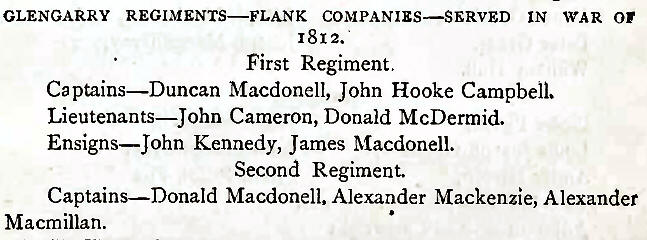
Lieutenants—Angus Kennedy,
Donald McMartin. Ensign—Alexander Macdonald. Adjutant—Donald Fraser.
Quarter-Master—John Mackenzie. Surgeon—Timothy Johnson.
We frequently read, too, of
the gallant Corps des Voyageurs Canadians, and, from its name, the
supposition would be that it r a, composed exclusively of our
French-Canadian countrymen. A list of its officers would indicate that some,
at any rate, of them hade from Glengarry, as their names are typical of
those found in such numbers there
The list is given in the
Quebec Almanac of 1813 as follows :—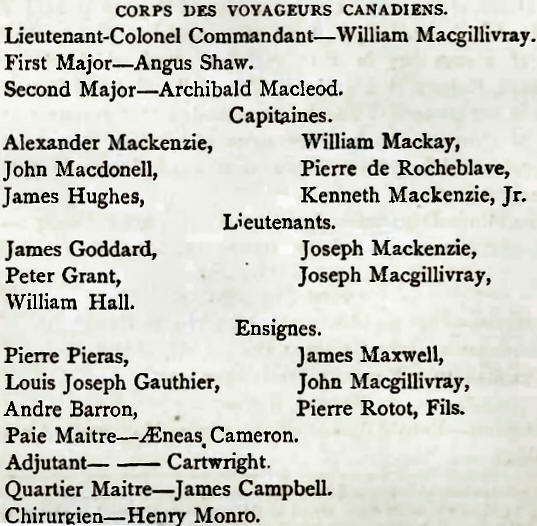
From the names of the
officers of this corps, there can be little or no doubt but that it was
raised by the officers of the Northwest Company. The Honourable William
Macgillivray, who was lieutenant-colonel commandant, was senior partner of
that Company, and I recognize the names of many other partners amongst them.
Mr. William Macgillivray was, with Bishop Macdonell, one of the founders of
the Highland Society in Canada, under a commission from the Duke of York,
President of the Highland Society of London, addressed to William
Macgillivray, Esq.; Angus Shaw, Esq.; the Reverend Alexander Macdonell, John
Macdonald, Esq., of Garth, and Henry MacKenzie. The institutional meeting
was held at St. Raphaels in the house of Mr. Argus McDonell. My father, who
was in 1844 secretary and one of the directors of the Highland Society, and
wrote an account of it, states that that meeting was attended by "three of
the best men and finest Highland gentlemen this Province ever saw, the late
Honourable William Macgillvray, the late Bishop Macdonell and the late
Honourable Neil MacLean, all of whom, though dead, still live in the hearts
of their countrymen."
In addition to the Glengarry
Fencible Regiment, another regiment raised at this time in Canada, and which
was also placed on the permanent establishment of the army, and so continued
until after the close of the war, when it was disbanded in 1816, was the
Canadian Fencible Infantry. The officers were as follows, Glengarry
contributing its quota, amongst whom was Alexander Fraser, who afterwards
represented the County and for many years commanded the First Regiment of
Glengarry Militia, which was 011 active service during the Rebellion of
1837-8 in both Upper and Lower Canada :—
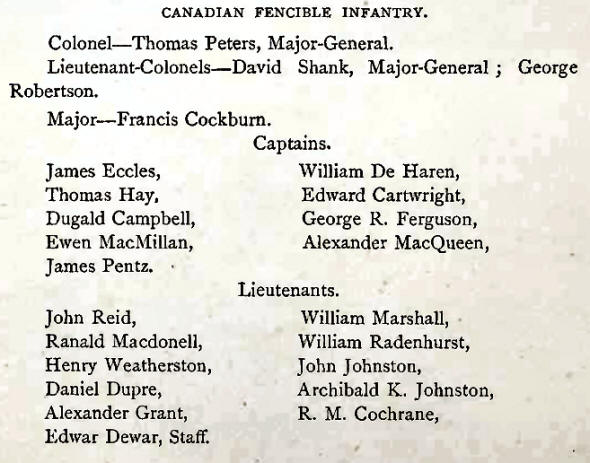
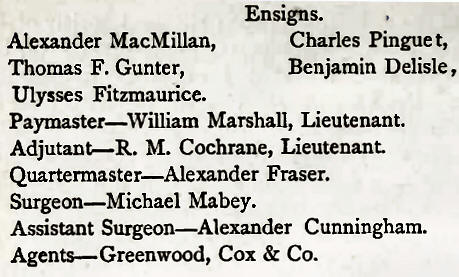
|
